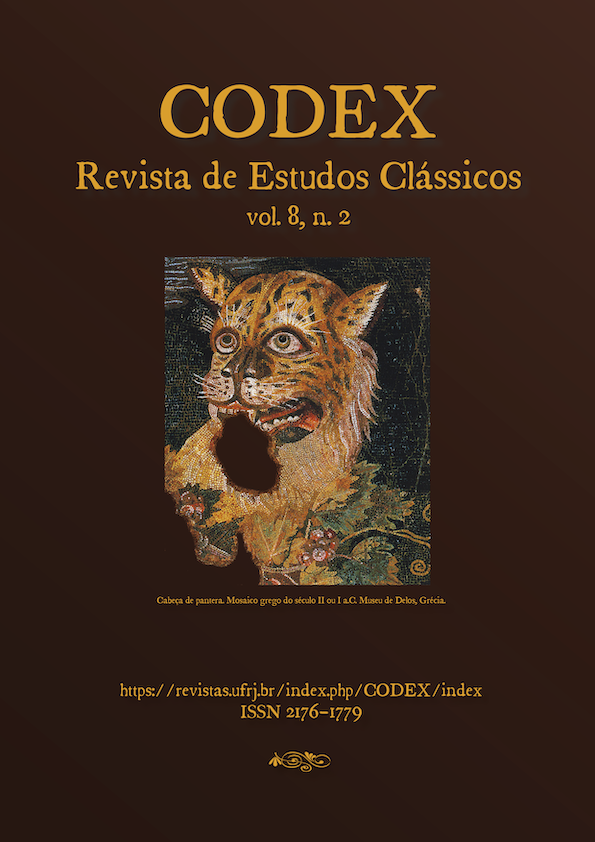Misogyny in Euripides’ biographical tradition
DOI:
https://doi.org/10.25187/codex.v8i2.38818Keywords:
ancient biography, ancient lives, Euripides, misogyny, AristophanesAbstract
There are more ancient biographical texts on Euripides extant to this day than on any other tragic poet of Classical Greece. Throughout this material, it is remarkable how the poet is persistently characterized as a misogynist (μισογύνης). The word appears in two of the most important biographical texts on Euripides (the anonymous Life attached to the medieval manuscripts of his works and the entry in the Suda), and his “aversion towards women” is directly or indirectly alluded in all the Lives that survived to this day. This article presents these occurrences and analyses them in the light of Aristophanes’ comedy. Finally, it proposes an articulation between the paradoxical receptions of the poet’s work in Antiquity and in modernity, when the image of a “feminist” Euripides will be constructed.
Downloads
References
BERMEJO, María de los Llanos Martínez. La recepción de la tragedia fragmentaria de Eurípides de Platón a Diodoro Sículo. Tese de doutorado apresentada ao departamento de Filologia Clássica e Indoeuropeu da Universidade de Salamanca. Salamanca, 2017.
CAIRNS, Douglas. “Euripides’ Medea: Feminism or Misogyny?” In: STUTTARD, D. (Ed.). Looking at Medea. Londres: Bloomsbury, 2014. p. 123-137.
COLLITS, Terry. “Intimations of Feminism in Ancient Athens: Euripides’ Medea.” Sydney Studies in English 26, p. 1-21, 2000.
DE MOURA, Camila. Vidas trágicas: Ésquilo, Sófocles e Eurípides no imaginário helenístico. Dissertação de Mestrado em Filosofia. Programa de Pós-Graduação em Filosofia da Universidade Federal do Rio de Janeiro. Rio de Janeiro, 2019.
DE TEMMERMAN, K.; DEMOEN, K. (Org.). Writing biography in Greece and Rome: Narrative technique and fictionalization. Cambridge: Cambridge University Press, 2016.
DELCOURT, Marie. “Biographies anciennes d’Euripide.” L’Antiquité Classique 2 (2), p. 271-290, 1933.
DUARTE, Adriane da Silva. (Trad.). Aristófanes. Duas Comédias: Lisístrata e As Tesmoforiantes. São Paulo: Editora Martins Fontes, 2005.
GUINSBURG, Jacob. (Trad.). A República de Platão. São Paulo: Editora Perspectiva, 2014.
HÄGG, Tomas. The Art of Biography in Antiquity. Cambridge: Cambridge University Press, 2012.
HADAS, Moses. Introduction to Classical Drama. Nova York: Bantam Books, 1966.
KANNICHT, Richard. (Ed.) Tragicorum Graecorum Fragmenta, Vol. 5: Euripides. Göttingen: Vandenhoeck und Ruprecht, 1985.
KIVILO, Maarit. Early Greek Poets’ Lives. Leiden: Brill, 2010.
KNOX, Bernard. “The Medea of Euripides.” In: KNOX, B. Word and Action: Essays on the Ancient Theater. Baltimore: Johns Hopkins University, 1979. p. 295-322.
KOVACS, David. Euripidea. Leiden: Brill, 1993.
LEFKOWITZ, Mary. The Lives of the Greek Poets. Baltimore: The Johns Hopkins University Press, 2012.
MARCH, Jennifer. “Euripides the Misogynist?” In: POWELL, Anton. (Ed.). Euripides, Women and Sexuality. London: Routledge, 1990.
MESSING, Andrew. Protofeminist or Misogynist? Medea as a case study of gendered discourse in Euripidean drama, 2009. Disponível em: < http://works.bepress.com/andrew_messing/2/>. Acessado em 10 de outubro de 2020.
MILLETT, Kate. Sexual Politics. Chicago: University of Illinois Press, 2000.
MOMIGLIANO, Arnaldo. The Development of Greek Biography. Londres: Harvard University Press, 1993.
NUNES, Carlos Alberto. (Trad.). Platão. Diálogos. Apologia de Sócrates, Critão, Menão, Hípias maior e outros. Belém: Editora da Universidade Federal do Pará, 1980a. Vol. I-II.
NUNES, Carlos Alberto. (Trad.). Platão. Diálogos. Protágoras, Górgias, O banquete, Fedão. Belém: Editora da Universidade Federal do Pará, 1980b. Vol. III-IV.
ROISMAN, Hanna M. “The Veiled Hyppolitus and Phaedra.” Hermes 127, p. 397-409, 1999.
SCHORN, Stefan. Satyros aus Kallatis. Sammlung der Fragmente mit Kommentar. Basileia: Schwabe Verlag, 2004.
SCODEL, Ruth. “The Euripidean Biography.” In: McCLURE, Laura. (Ed.). A companion to Euripides. Chichester: John Wiley & Sons Inc., 2017, p. 27-41. (Blackwell Companions to the Ancient World.)
WESTERMANN, A. (Ed.). Biographoi: Vitarum scriptores Graeci minores. Braunschweig, 1845. Repr. Amsterdam: Hakkert, 1964.
Downloads
Published
How to Cite
Issue
Section
License
This work is licensed under a Creative Commons Attribution-NonCommercial 4.0 International License.










